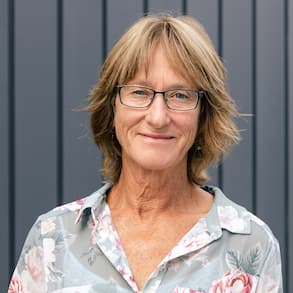Trust has been a ‘gamechanger’ for tenants

Nelson Tasman Housing Trust director Carrie Mozena at the Totara St development which will be completed by the end of the month. Photo: Anne Hardie.
It is 20 years since a small group of community leaders decided they had to do something about the increasing homelessness and housing stress, so formed Nelson Tasman Housing Trust. To date it has built 60 rental homes and plans to double that in the next four years.
The trust celebrates its 20-year milestone next week and director, Carrie Mozena, acknowledges it is an ambitious, but achievable, goal to expand its portfolio to 120 homes by the end of 2028.
It has the organisational muscle to do it, she says, plus the momentum to keep going and that’s exactly what it intends to do to house people who need a stable home.
Remembering back to the trust’s beginnings, she says the group decided to “not just moan about a problem, but actively look for solutions”.
They formed a trust and started looking for money. The government had just started a housing innovation fund and the trust managed to secure a capital grant from it, that was then paired with funding from then Canterbury Community Trust (now Rata Foundation) to build the first development.
It was four two-bedroom homes on Kawai St, built for under $1 million and it won them the national Housing New Zealand Community Development award. Now, with 60 homes under its belt – including a development on Totara St in Nelson which will be completed by the end of the month – it is building at a steady pace. A further 18 are in the development stage in Nelson, while a site in Richmond has been identified and is going through the funding process.
Building the homes is the easy bit, she says.
Preparing and doing all the financial planning and modelling takes time and then the real work is when the trust puts people in those homes and manages the homes. It’s all done with a small team of five – not all fulltime – and a board of volunteer trustees.
The bulk of the funding over the years has been through a series of different central government grant schemes, low interest loans or rental subsidies.
This means the changing New Zealand housing policy is one of its major challenges, like now when the Government has paused funding. If funding is paused too long, Carrie says it will interrupt a smooth flow in the pipeline of new developments that are crucial to an ever-increasing need for housing. But she remains hopeful that new funding settings will be announced before Christmas and funding for new projects will resume.
“I know the need continues to increase so we’re very motivated to work as hard as we can to deliver more homes. One thing we’ve learnt over the years is we have to be agile. We have to respond to a changing environment that is always changing, and that’s a development environment as well as a funding environment.”
The trust is actively advocating for more housing funding to come into the region which she says has a high number of low-income workers who struggle to find affordable rentals.
“What we don’t want to see is more families and more older people living in their cars and living on the street. The only way out of that is to get more affordable homes built.”
For Carrie, the highlights from the trust’s first 20 years has been the response from the people they home.
“People tell us what a gamechanger it is. Just being able to move into a new, healthy home that is secure. People tell us the best thing about it is ‘I feel a sense of stability and security and it helps my wellbeing enormously because I know you are not going to sell out from under me’.
“That uncertainty can be tough. It destabilises people. People tell us they’ve moved 14 times in the last 10 years and just want a stable home.”
She says there is still so much to do, but feels the trust is in a good place to tackle it.
“I feel like we’re going from strength to strength. We’ve got strong governance, a really strong, committed staff, organisational muscle and a balance sheet of over $30 million and good relationships with our bank and with suppliers. We’ve got the systems and momentum in place to keep going.
“I’ve always said, we’re in this for the long haul; we’re playing a very long game. It’s a multi-generational effort to deliver more housing for people on low to modest incomes, for the whole region.”
Carrie says she would love the trust to expand into Motueka and it’s a matter of looking for both land and funding opportunities.
